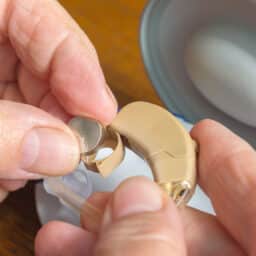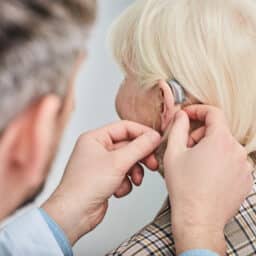What Emotions Can You Expect When You Begin Hearing Loss Treatment?

Making the decision to begin treating your hearing loss is a huge first step into a life of clearer sounds and easier connections. Approximately 28.8 million U.S. adults could benefit from the use of hearing aids. Beginning hearing aids is different for everyone, and it can be challenging to know how you’ll react to your…
Winter Hearing Aid Care: Essential Tips for the Chillier Months

Approximately 28.8 million U.S. adults could benefit from the use of hearing aids. These small but technologically advanced devices collect and amplify speech sounds while reducing background noise to help you understand the people in your life. As temperatures drop, winter can pose unique challenges for hearing aid care. From frigid temperatures in Heritage Park…
What Emergency Alarms Exist for People with Hearing Loss?

In emergencies, the standard protocol relies heavily on audible alarms, but where does that leave people with hearing loss? For those who may be unable to hear traditional emergency sounds, exploring alternative alert options becomes necessary. Fortunately, there are a variety of solutions that can offer a sense of security in worst-case scenarios. Understanding these…
How Can You Manage Your Tinnitus at Work?

Tinnitus, or the presence of ringing, buzzing or other sounds in one or both ears when no sound is present, is common. According to the National Institute of Deafness and Other Communication Disorders, it affects approximately 10% of the U.S. population. If you live with tinnitus symptoms, you may be wondering how to effectively manage…
What Are the Benefits of Wearing Hearing Aids While Alone?

Hearing aids are remarkable tools that can help improve communication, manage tinnitus symptoms, increase your spatial awareness, suppress unwanted noise and more. While the benefits of hearing aids may be most apparent when you’re communicating with your friends and family or ordering a latte at The Porch, they can also be of great use in…
What is Digital Noise Reduction in Hearing Aids?

Navigating loud environments is difficult for everyone, especially if you have hearing loss. While any hearing aid can help, devices equipped with digital noise reduction (DNR) technology can provide users with the best listening experience. Why Are Noisy Places Hard for People With Hearing Loss? Hearing loss makes it harder to understand speech, especially in…
Tips for Protecting Your Ears While Wearing Hearing Aids

Hearing aids are an effective and popular tool for those with hearing loss. According to the Centers for Disease Control and Prevention (CDC), 7.1% of adults aged 45 and over used a hearing aid in 2019. While hearing aids make it easier to process sounds and navigate throughout your daily life, it’s still important to…
How to Have the Best Valentine’s Day with Hearing Loss

Approximately “One in eight people in the United States (13 percent, or 30 million) aged 12 years or older has hearing loss in both ears, based on standard hearing examinations,” reports the National Institute on Deafness and Other Communication Disorders. If you’re among this number who have hearing loss, you may be curious how you…
Tips for Making Your Hearing Aid Batteries Last Longer

Hearing aids are a game changer for people with hearing loss. They may so many situations easier, from enjoying your granddaughter’s dance recital to having a relaxing conversation with your spouse while out to eat at The Barley Hound. The last thing you want when out at these important events is for your hearing aids…
Learn About the History of the Hearing Aid for Audiology Awareness Month

Millions of people in the United States use hearing aids. Data from 2019 indicated that 7.1% of adults 45 and older used a hearing aid to treat their hearing loss. If you use a hearing aid, you probably appreciate the improved ability to listen and communicate with others, whether at work or when dining out…
